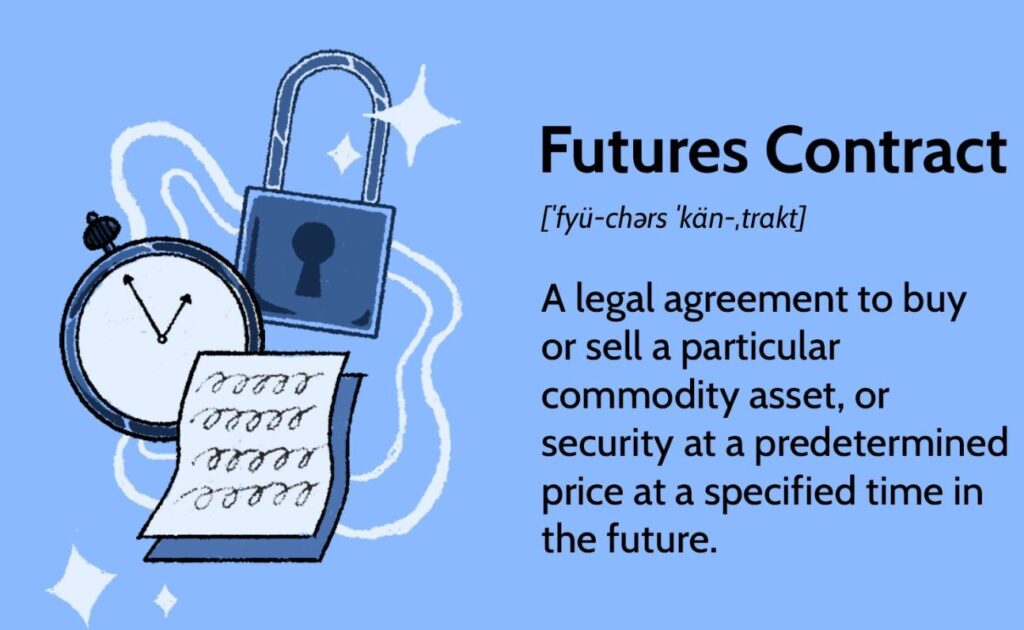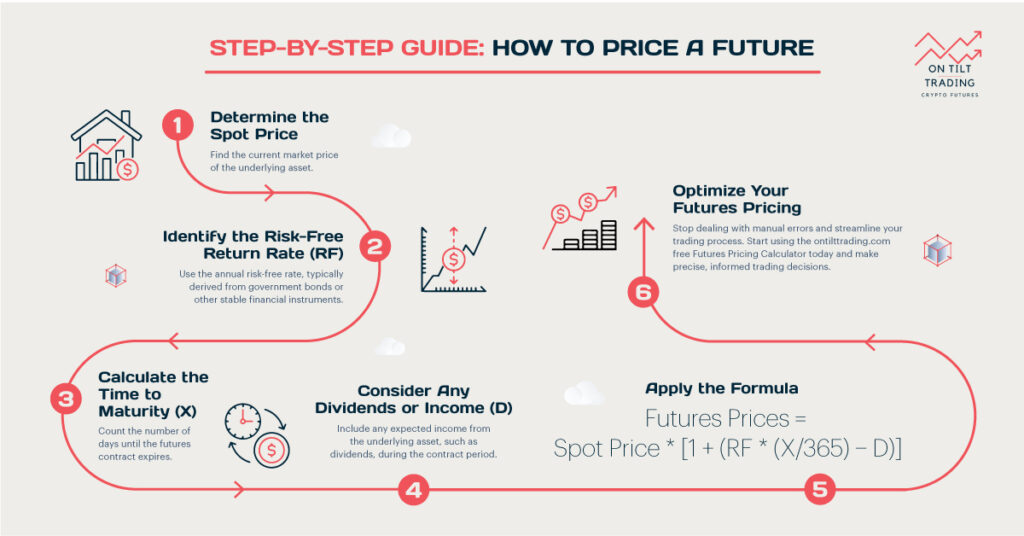Your financial situation, risk tolerance, and investment objectives determine whether futures contracts are appropriate for you. For many businesses, the use of futures can provide valuable price stability. In addition, futures can help individual investors diversify their portfolios and increase profits. The investments should, however, be part of an overall investment strategy that is well-balanced. Let’s take a look at what is the downside of futures contracts.
What are Future Contracts?
The purpose of futures contracts is to buy or sell a specific asset at a fixed price at a future date. These contracts are standardized, meaning they have fixed quantities and qualities of the underlying asset.
Suppose a cryptocurrency miner wants to secure a price for their mined Bitcoin six months in advance. They could enter into a futures contract with a cryptocurrency exchange, agreeing to sell 10 Bitcoins at $50,000 per Bitcoin on December 1st. This contract would hedge against potential price declines in Bitcoin and provide price stability for the exchange’s trading operations. You can invest in future contracts without risking much.

Popular Futures Choices
Futures contracts are available for a wide range of assets:
- Commodities: Agricultural products (wheat, corn, soybeans), energy (crude oil, natural gas), and metals (gold, silver, copper).
- Financial instruments: Stock indices (S&P 500, Dow Jones), currencies, and interest rates.
- Cryptocurrencies: Bitcoin and Ethereum futures have become increasingly popular.
An airline might use jet fuel futures to hedge against rising oil prices, while a multinational corporation could use currency futures to protect against unfavorable exchange rate movements.
What is the Downside of Futures Contracts?
While futures can be valuable tools for hedging and speculation, they come with several significant drawbacks. Some of the downside of futures contracts are:
No Control Over Future Events
One of the primary disadvantages of futures contracts is that they lock in a price based on current expectations, but future events can dramatically change the market landscape.
Let’s say a gold mining company locks in a selling price of $1,800 per ounce for delivery in six months. If a major new gold deposit is discovered during that time, flooding the market and causing gold prices to plummet to $1,500 per ounce, the mining company would still be obligated to sell at the higher price. While this might seem advantageous, it could make their gold less competitive in the market.
Leverage Issues
Futures contracts typically involve high leverage, meaning investors can control large positions with a relatively small amount of capital. While this can amplify gains, it also magnifies losses.
An investor puts down $5,000 to control a crude oil futures contract worth $50,000. If the oil price moves just 5% against their position, they could lose their entire initial investment.
Expiration Dates
Unlike stocks, which can be held indefinitely, futures contracts have expiration dates. This creates pressure to either close out the position or prepare for delivery of the underlying asset. A speculator buys a corn futures contract expiring in three months. As the expiration date approaches, they must decide whether to sell the contract or be prepared to take delivery of several tons of corn – a problematic situation if they don’t have storage facilities!
Closing Contracts
Closing out a futures position can sometimes be challenging, especially in less liquid markets or during times of high volatility. An investor holding soybean futures might find it difficult to close their position if there’s a sudden drought affecting crops, as other market participants may be unwilling to take the opposite side of the trade.
What to Do to Avoid Risks?
Use Stop-Loss Orders
Implementing stop-loss orders can help manage risk by automatically closing out your position if losses reach a predetermined level. For example, if you buy crude oil futures at $70 per barrel, you might set a stop-loss order at $65 per barrel. If the price drops to $65, your position will automatically be closed, limiting your potential losses.
Diversify
Spreading your investments across different futures contracts or markets can reduce overall risk. For instance, instead of investing solely in agricultural commodities like wheat, diversify into energy commodities like natural gas and metals. It helps you to balance exposure to different market factors.
Take the Time to learn
Understanding the mechanics of futures trading and the factors influencing asset prices is crucial. For example, a trader looking to invest in stock index futures should research economic indicators and corporate earnings reports that impact stock market movements.
Start Small
Begin trading futures with smaller positions to gain experience and limit initial capital risk. For example, instead of investing $50,000 in a single futures contract, start with $5,000 to understand market dynamics and refine your trading strategy.
Use Options on Futures
Options on futures contracts provide a way to gain exposure with limited downside risk. For instance, rather than purchasing a soybean futures contract outright, an investor could buy a call option on soybean futures. This limits potential losses to the premium paid for the option while still allowing them to benefit from potential price increases in soybeans.
Many experienced traders recommend starting with paper trading (simulated trading with no real money at stake) to gain experience before committing to actual capital. Additionally, it’s often wise to consult with a financial advisor who has expertise in derivatives trading to ensure that futures align with your overall financial goals and risk tolerance.
Besides, the right tool can help you manage risks. Our On Tilt Trading Position Size Calculator determines ideal trade sizes based on your risk tolerance. Optimize your trades and trade with confidence today!
Benefits of Future Contacts
Generally, trading futures is best done during periods of high liquidity and price movement, such as during market opening hours. Here are the advantages of investing in futures.
Price Certainty
Futures contracts enable businesses to fix prices for future transactions, providing predictability and aiding in budgeting. For example, a bakery might purchase wheat futures contracts at $5 per bushel to ensure stable costs for flour, allowing them to set consistent product prices regardless of market fluctuations.
Hedging Opportunities
Companies use futures contracts to hedge against adverse price movements in essential inputs or outputs. For instance, an airline might hedge against rising fuel costs by buying crude oil futures contracts. If oil prices increase, the losses from higher fuel expenses can be offset by gains in the futures contracts.

Market Efficiency
Futures markets facilitate efficient price discovery for underlying assets, benefiting both buyers and sellers. For example, agricultural producers can use corn futures prices as a benchmark to negotiate contracts with food processors, ensuring fair market value for their crops.
Leverage
Futures contracts allow investors to control a large amount of underlying assets with a relatively small initial investment. For instance, an investor might control $100,000 worth of stock index futures with only $5,000 in margin, potentially magnifying returns if the market moves favorably.
Portfolio Diversification
Futures provide exposure to asset classes such as commodities, currencies, and indices that may not be easily accessible through other financial instruments. For example, a pension fund could diversify its portfolio by investing in bond futures to manage interest rate risk alongside traditional equity investments.
FAQs
Can I sell futures before expiry?
Yes, you can sell futures contracts before their expiry date. Selling a futures contract before expiry allows traders to realize profits or cut losses based on market conditions and their trading strategies. It’s a common practice among investors and speculators to manage risk.
Are futures good for beginners?
For beginners, futures trading can be challenging due to its leverage and risk. Before investing real money, beginners should understand the market and practice with simulated trading platforms. It will help them to succeed.
What is the success rate of futures trading?
The success rate of futures trading varies widely among traders. Success depends on individual skills, market knowledge, risk management practices, and market conditions. Consistent profitability in futures trading often requires discipline, patience, and continuous learning.
Final Words
That’s all from today’s round-up on what is the downside of futures contracts. However, for those who understand these risks and use appropriate risk management strategies, futures can provide valuable opportunities for hedging and potentially profitable trading. In addition, utilizing the correct tools is essential for profitable trading.



